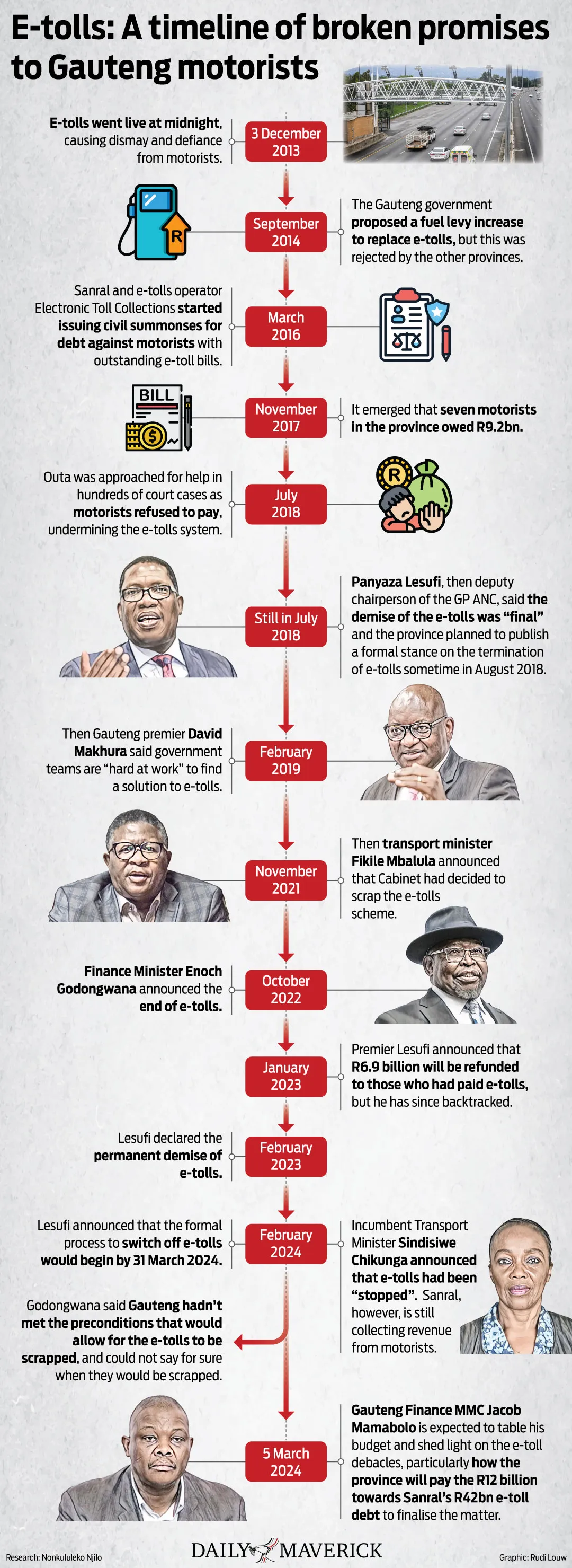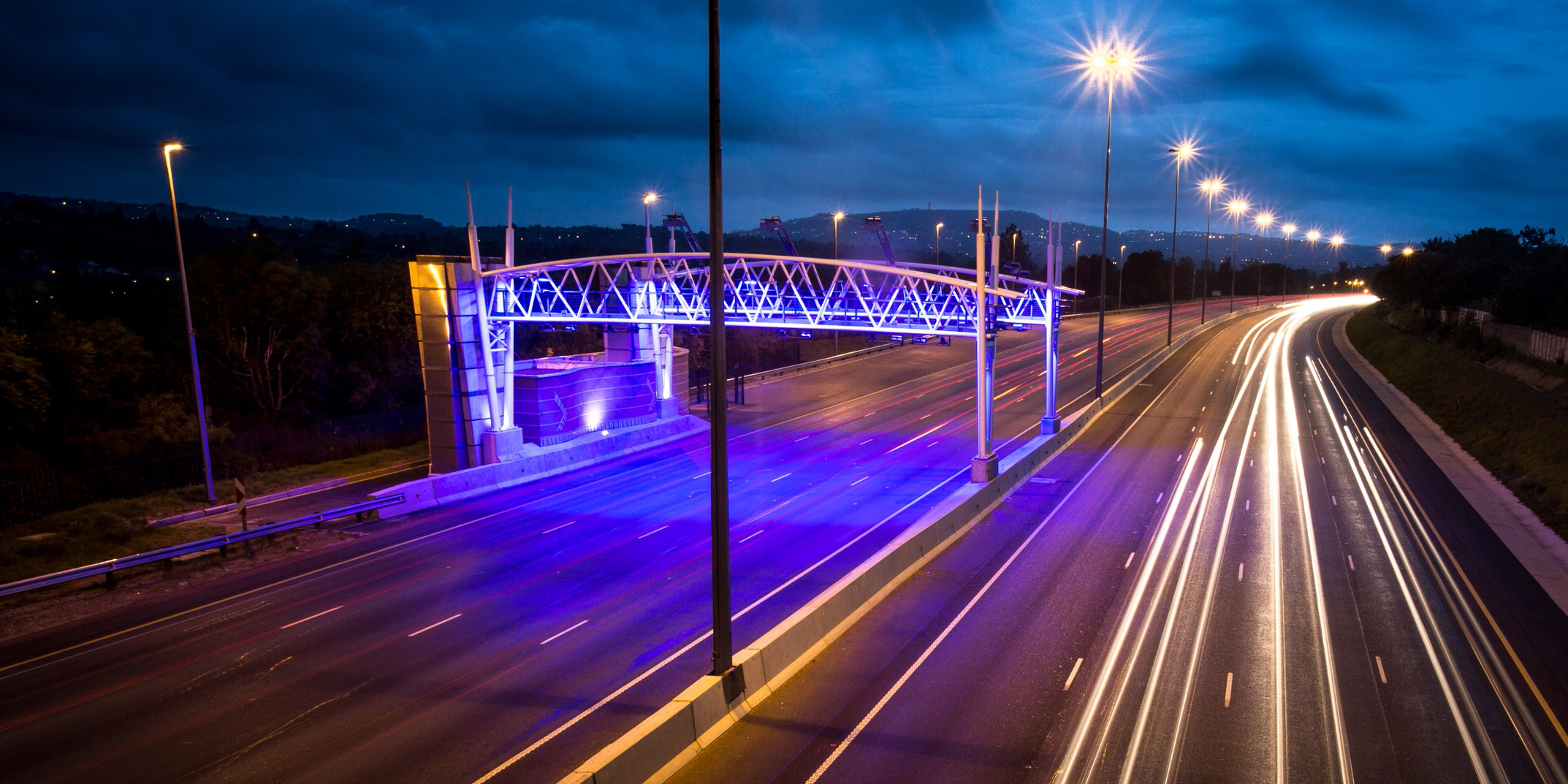The South African National Roads Agency Limited (Sanral) continues to debit money from Gauteng motorists as the government scrambles to permanently put an end to the disastrous e-toll system by the end of March 2024.
This comes as the Gauteng provincial government, National Treasury, Department of Transport and Sanral have all shared conflicting information – leading to widespread confusion on the status of the project.
During his 2024 State of the Province Address (Sopa) on 19 February, Gauteng Premier Panyaza Lesufi said a “final meeting” was held between the Gauteng government and the ministers of finance and transport in January 2024.
In the meetings, they are said to have found common ground on issues related to the user-pay principle of debt related to the Gauteng Freeway Improvement Project (GFIP), past capital expenditure costs and yearly maintenance costs.
“E-tolls were a system that was introduced to our province by the national government in a bid to improve our roads. However, we have reached a point where we all accept that the people of Gauteng have rejected e-tolls,” Lesufi said in his Sopa.
“From where we sit as the province, we remain confident that we should be able to end e-tolls by [the end of] March 2024,” Lesufi said.
Read more in Daily Maverick: Five key takeaways from Gauteng Premier Lesufi’s State of the Province Address
The premier would not go into further detail on the issues of repurposing the gantries, repaying debt from the first phase of the GFIP and funding phases two and three. Instead, he said Finance Minister Enoch Godongwana would provide details in his budget speech. However, Godongwana made no mention of e-tolls in his speech.
Deal or no deal
It appears that Lesufi may have jumped the gun as Godongwana has said Gauteng has not yet met the preconditions that will allow for e-tolls to be scrapped and has not pinpointed when they will be scrapped. The minister was addressing MPs in Parliament’s joint finance committees.
Sanral’s debt stood at more than R42-billion as of 31 December 2023. In a previous agreement, the Gauteng government had committed to paying 30% of the debt.
“We had an agreement to split Sanral’s e-toll debt at 70:30. We made our commitment and gave money to Sanral last year. Now, the province is supposed to give us money. The province also has to answer the question: who will do the maintenance? That is a discussion they are having with the Department of Transport. Unless that agreement is tied down, we can’t commit to when the gantries can go,” Godongwana said.
It remains unclear whether the Gauteng government has the financial muscle to pay 30% of Sanral’s debt and the required annual R3-billion to maintain the 201km infrastructure as well as where the money will be sourced from, in light of the province’s deteriorating purse.
In another confusing move, Transport Minister Sindisiwe Chikunga said in an interview with Newzroom Afrika that e-tolls had been “stopped”.
“The e-tolls programme has actually been stopped; what we are working towards is to actually switch off the gantries, for the e-toll purposes but not [for other] purposes,” she said, referring to the possibility that the gantries could be used for other purposes.
She could not rule out the possibility of further delays. Asked if she could confirm if 31 March would indeed be D-day, she responded: “I hope so; there might be other small things that need to be finalised, but we are working towards a deadline so that we do not have to go beyond this financial year to the new financial year.”
Sanral spokesperson Vusi Mona would not be drawn into commenting on the confusing messages except to say Sanral had taken note of various pronouncements on the GFIP and e-tolls.
“Sanral will take direction from its shareholder representative, the Minister of Transport, before making any comment on the matter.”
In the meantime, the entity is still collecting revenue from motorists.
“Sanral is still collecting e-tolls as the legal process to halt the obligation to pay tolls on the GFIP network has not been concluded.”
E-toll roads in Gauteng make up 1% of Sanral’s national network. The Gauteng road network is in desperate need of restoration, which will be costly. According to Sanral, 85% of Gauteng’s roads are beyond their design life cycle and need significant investment into maintenance. Where funding for this exercise will come from remains a mystery.
Read more in Daily Maverick: End of e-tolls creates a funding headache for Gauteng roads
Among the most important questions that remain is what will happen to the gantries. Lesufi’s office has repeatedly insisted that they will be used as a crime-fighting tool. Mona could neither confirm nor deny this.
“The e-tolls infrastructure is a significant asset which is able to assist with improved mobility, road safety and other transport-related services on Gauteng’s freeways. Sanral is committed to working with all stakeholders in this regard.”

More questions than answers
Another element that has led to widespread confusion is what is to be done with any outstanding e-toll bills.
The deputy director-general of public finance at the National Treasury, Mampho Modise, told MoneyWeb: “Gauteng has agreed that that debt should and will be collected”, adding that a process of how to do this was under way.
The Organisation Undoing Tax Abuse (Outa) CEO Wayne Duvenage, however, said this was unlikely to happen, particularly in an election year. He said it had, however, created further confusion.
“It appears that nobody knows what is really going on when it comes to finalising the e-toll debacle.”
It also remains unclear whether the motorists who had paid or continue to pay for the scheme will be reimbursed. Duvenage, who has been at the forefront of protesting against the system, previously warned: “Those people who are paying must know that the likelihood of them getting refunded is slim to zero.”
Duvenage said that should the government or Sanral continue to collect outstanding debt, Outa would tackle them head-on.
Initially, the disastrous e-tolls project was meant to come to an end on 31 December 2022. The deactivation date was later pushed to early 2023 because certain components of the memorandum of understanding between the national and provincial governments still needed to be finalised.
Once again, Lesufi jumped the gun as he declared the permanent demise of e-tolls during the 2023 Sopa.
“Residents of Gauteng, we are pleased to report that e-tolls have been scrapped permanently in our province. Together with the minister of finance and transport, we will make a joint announcement in this regard.”
Read more in Daily Maverick: Even the opposition cheers as Gauteng Premier Lesufi announces the scrapping of e-tolls
To date, no announcement has been made nor has a service agreement been signed.
While Lesufi’s spokesperson Sizwe Pamla declined to respond to questions, his boss took to social media platform X to reiterate that e-tolls were a thing of the past – despite Godongwana’s comments.
“E-tolls are history. We will clear up the confusion. Thanks to the transport minister for clarifying this confusion. Sunrise will not find us where sunset lets us. Days are never counted backwards.”
The e-tolls, however, cannot be history until the regulations enabling the system have been repealed, a service agreement has been signed, the Gauteng provincial government has paid back 30% of more than R40-billion Sanral debt, and an official gazette by the Department of Transport.
Gauteng MEC for Treasury Jacob Mamabolo is expected to shed some light on the matter when he tables his budget on 5 March 2024. DM





